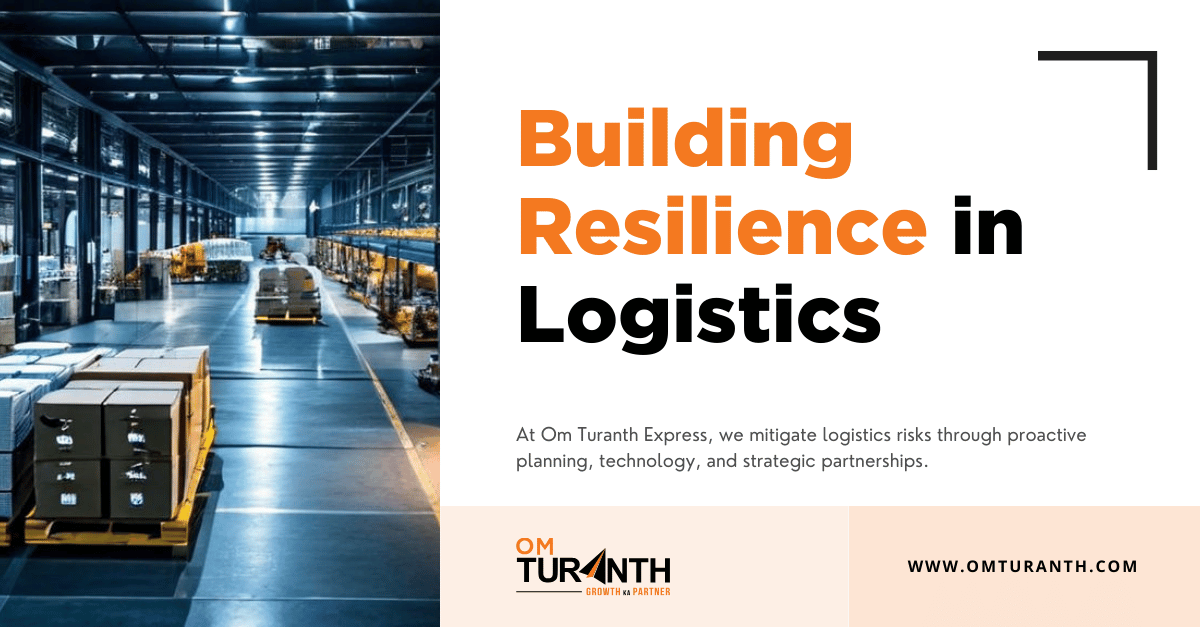Building Resilience: Risk Management Strategies in Logistics

In the fast-paced world of logistics, being resilient is crucial. From unexpected disruptions to preparing for peak seasons, effective risk management plays a pivotal role. This case study delves into how Om Turanth Express has implemented robust strategies to ensure smooth operations and reliability for its clients.
Identifying Potential Risks
Understanding the diverse risks in logistics is the first step in fostering resilience. Om Turanth Express categorizes risks into several key areas:
- Operational Risks: These encompass issues like delays, equipment failures, and workforce challenges.
- Environmental Risks: Natural disasters, severe weather conditions, and global pandemics.
- Market Risks: Fluctuations in demand, fuel costs, and economic downturns.
- Compliance Risks: Changes in regulations and legal requirements.
Strategies for Risk Mitigation
1. Proactive Planning and Forecasting
- Accurate Demand Forecasting: Using historical data and market insights to predict demand spikes and manage inventory effectively. Explore more on the importance of efficient logistics.
- Contingency Planning: Developing flexible logistics strategies that can swiftly adapt to changing circumstances.
2. Technology Integration
- Real-Time Tracking: Implementing state-of-the-art tracking systems for continuous monitoring and timely updates on shipments.
- Automation: Leveraging automation to streamline processes and minimize the risk of errors. Discover innovations shaping logistics.
3. Collaboration and Partnerships
- Third-Party Logistics Providers: Collaborating with trusted third-party logistics partners to handle overflow and ensure operational continuity.
- Supplier Relationships: Cultivating strong ties with suppliers to secure priority access during peak demand periods.
4. Resource Optimization
- Efficient Routing: Utilizing advanced routing algorithms to optimize delivery routes and reduce transit times.
- Fleet Management: Maintaining a well-managed fleet capable of handling increased workloads efficiently.
- Warehouse Management: Implementing efficient warehouse systems to streamline operations. Learn effective handling of bulk shipments.
Real-Life Implementation: Om Turanth Express
Scenario: Managing Supply Chain Disruptions During Global Events
During global crises like the COVID-19 pandemic, global supply chains faced unprecedented challenges. Om Turanth Express responded by enhancing their risk management strategies, ensuring that critical supplies continued to reach their destinations. They implemented robust real-time tracking systems and maintained close communication with clients to manage expectations and provide timely updates.
Scenario: Adapting to Market Dynamics
In response to fluctuating fuel prices and market demands, Om Turanth Express utilized their adaptable logistics plans and strong supplier relationships. They optimized routing and employed scalable solutions to maintain service levels and manage costs effectively. Explore guidelines for selecting the right logistics partner.
Conclusion
Building resilience in logistics demands a proactive approach to risk management. Om Turanth Express exemplifies how proactive planning, technological integration, and strategic collaborations can enable logistics providers to navigate uncertainties and sustain seamless operations. By adopting these strategies, logistics providers can enhance their resilience and achieve long-term success.